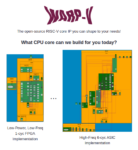You are currently viewing SemiWiki as a guest which gives you limited access to the site. To view blog comments and experience other SemiWiki features you must be a registered member. Registration is fast, simple, and absolutely free so please,
join our community today!
WP_Term Object
(
[term_id] => 178
[name] => IP
[slug] => ip
[term_group] => 0
[term_taxonomy_id] => 178
[taxonomy] => category
[description] => Semiconductor Intellectual Property
[parent] => 0
[count] => 1952
[filter] => raw
[cat_ID] => 178
[category_count] => 1952
[category_description] => Semiconductor Intellectual Property
[cat_name] => IP
[category_nicename] => ip
[category_parent] => 0
[is_post] =>
)
There are now over a hundred RISC-V CPU cores listed on riscv.org‘s RISC-V Exchange! Amazing. If you need a RISC-V CPU core, you’ll likely be able to find one that suits your needs… if you evaluate a hundred CPU cores to find it.
Or, now, you can configure exactly the core you need, and have it built in seconds, for free! WARP-V … Read More
When thinking about positioning you probably first think of navigation. The device in your car that helps get from where you are to where you want to be. Or navigating while hiking in the backcountry. But those applications are not the where the big unit growth will come. The biggest demand will be in asset tracking, expected to reach… Read More
This summer, I got the opportunity to work as a Formal Verification Intern with Axiomise for six weeks. I’m a keen designer and love working in design and architecture. Although, I’ve not started my professional career yet, I have done most of my projects as a designer in my undergraduate and postgraduate studies.
Having said that,… Read More
“Kandou it”by Lauro Rizzatti on 06-15-2021 at 10:00 amCategories: IP
In another departure from my chip design verification “beat,” I took a look at Kandou and like what I learned.
Kandou from Lausanne, Switzerland, boasts “Kandou It” as its tagline and as it should be if Kandou’s USB-C multi-protocol retimer solution with USB4 support is inside next-gen laptops, notebooks, desktops, tablets and… Read More
The founder of Mirabilis Design, Mr. Shankar has over two decades of experience in management and marketing of system level design tools. Prior to establishing Mirabilis Design, he held the reins as Vice President, Business Development at MemCall, a fabless semiconductor company and SpinCircuit, a joint venture of industry… Read More
Three-year old CacheQ, founded by two former Xilinx executives and a clever group of engineers, produces a distributed heterogenous compute development environment targeting software developers with limited knowledge of hardware architecture.
The promise of compiler tools for heterogeneous compute systems intrigued… Read More
In today’s System-on-Chip (SOC), analog blocks are used in many places such as I/O cells for communication, PLLs for generating clocks, LDO’s for converting supply voltage to internal rail voltage, Sensors for qualifying external characteristics such as temperature, light, motion, etc. However new advanced designs now require… Read More
This standard has been around in one form or another for over ten years and was then arguably ahead of its time. RTL designers were confused: ‘We already have RTL. Why do we need something else?’ I also didn’t get it. Still, the standard plugged ahead among the faithful and found traction among IP vendors. Particularly as a common format… Read More
The continued innovation and widespread adoption of connected devices — the internet of things (IoT) — has resulted in a vast range of conveniences that improve our lives every day. At the same time, the ubiquity of IoT devices, which market watchers estimate to be in the tens of billions, also makes it more attractive to bad actors… Read More
Throughout history, people have sought after security as a basic right and expectation within a civilized society. Even as recent as a few centuries ago, things were very simple. Subjects looked to their rulers to provide security for their lives and assets. Assets were mostly hard assets such as jewelry, coins or real estate. … Read More












AI Bubble?